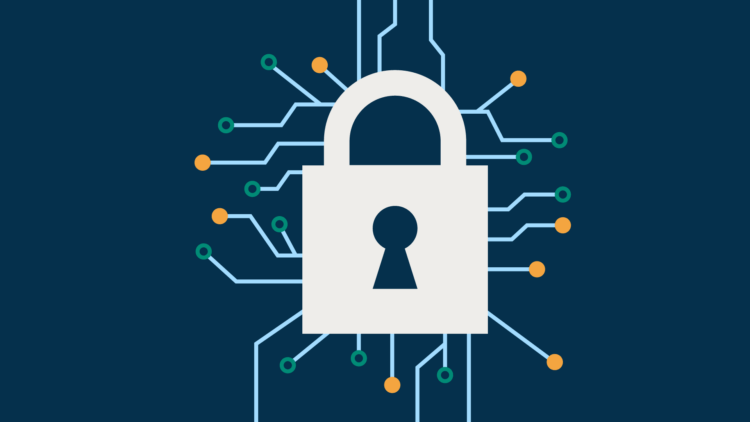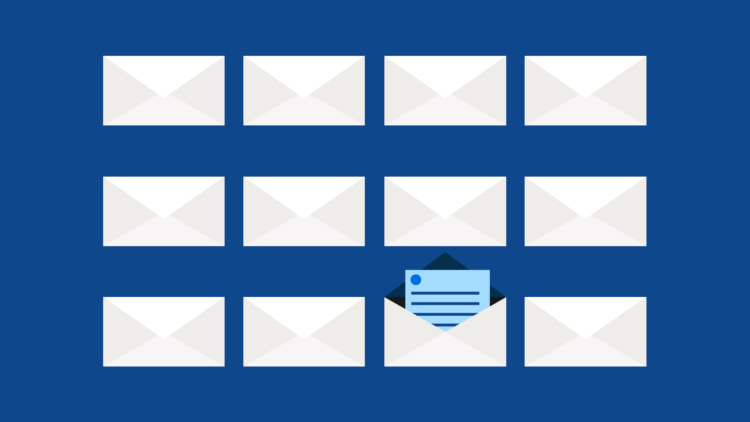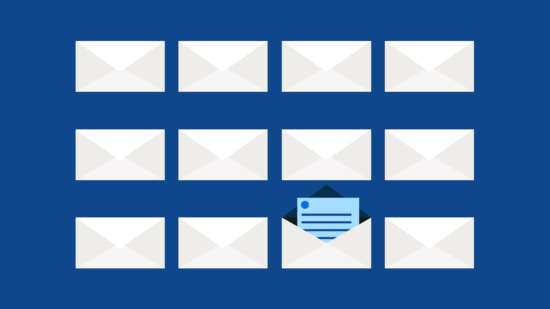Email is central to any legal professional’s day. Whether corresponding with colleagues, communicating with clients, or staying up-to-date with court notifications, lawyers’ email inboxes are brimming with a near-constant stream of messages—it can be seriously overwhelming.
While the sheer volume of emails that lawyers juggle daily is stressful in itself, the consequences of ineffective email management can be more pervasive. A disorganized inbox and disorderly email system can negatively impact productivity, client relationships, and professional standards.
In this blog post, we’ll outline everything that legal professionals need to know about email management. From best practices to keeping your inbox organized to strategies for effective time management to how to choose the right email management system, read on for our tips for email management.
Why is email management crucial for lawyers?
No one loves dealing with an overflowing email inbox, but email management is especially vital for lawyers. Without a proper email management system, a lawyer’s inbox can quickly become chaotic—which can, in turn, lead to decreased productivity, increased stress, and a higher probability of missing critical communications or putting sensitive client information at risk.
Let’s explore key reasons why lawyers should prioritize effective email management:
The challenges of email overload
Email overload occurs when someone receives more emails than they can keep on top of, leading to stress and overwhelm.
This problem impacts workers across industries, which makes sense considering how much time many people dedicate to reading and replying to emails. Specifically, according to a recent Microsoft study, some employees spend up to 8.8 hours a week, or nearly two hours a workday, on email. In document-intensive and high-communication professions like the law, it’s likely that many lawyers regularly spend hours a day on email.

Over time, email overload for lawyers can lead to:
- Extra work time. A few seconds here, a few minutes there—time spent clicking on and reading unnecessary communications, searching for emails, or toggling back to an email draft you got distracted from adds up.
- Productivity loss. That extra time and energy spent trying to get through emails takes time away from other tasks.
- Communication challenges. With too many emails to handle, you’re more likely to miss or forget to follow up on critical communications. This can be detrimental if you miss key documents or deadlines. And, if you miss out on client communications, it can negatively impact client relationships.
- Increased stress. Feeling overwhelmed or like you’re always playing catch up is, quite simply, stressful.
Disorganized email impacts lawyer productivity
A disorganized, inefficiently managed inbox drains productivity. Sifting through piles of messages takes up extra time, is distracting, and makes it harder to stay focused.
Disorganized email also impacts productivity with law firm collaboration. When lawyers and team members can’t easily find emails within an email management system, it’s challenging to delegate and can lead to unnecessary delays and miscommunication.
Maintaining client confidentiality
Lawyers have a duty to keep their clients’ data safe, secure, and confidential. While there are security steps that lawyers can take to protect client information in emails (more on that later in this blog post), a disorganized email management system puts client confidentiality at risk in multiple ways, such as:
- Overlooked messages. In a cluttered inbox, lawyers may accidentally overlook or forget to respond to emails containing confidential client information.
- Unintended recipients. When emails are disorganized, it’s easier to accidentally email confidential information to the wrong person. Read about ABA Formal Opinion 503, which addresses “reply all” emails and texts for lawyers.
- Inadequate security protections. Not all emails a lawyer receives include sensitive information, but those that do should be managed with special care. With a disorganized email system, lawyers may inadvertently fail to ensure confidential information is treated correctly.
Best practices for organizing your inbox
Email management is important for lawyers, but the process of organizing an inbox can be, in itself, overwhelming. Consider the following best practices:
Create folders and labels for easy categorization
An orderly inbox needs structure. After all, it’s hard to keep emails organized without a clear spot to file them. This is where folders and labels come in.
Create folders and labels for different categories of emails, such as for:
- Specific clients
- Matters
- Subjects
- Court documents
- Continuing legal education and training
- Administrative communication
- Bar association
Dedicated spots make it easier to quickly file, sort, search, and prioritize emails for an organized, efficient, and functional email inbox.
Implement a consistent naming convention
When creating folders and labels, use clear and consistent naming conventions to keep them organized and easy to navigate. Best practices include:
- Using standardized formatting. When creating folders, consider using a consistent format such as “FirstNameLastName_Case_Date,” as well as standardized abbreviations.
- Following a hierarchy. Implement a logical hierarchical structure of main folders and subfolders.
Be sure to document your naming conventions, formatting, and abbreviations so that all team members can follow the same structure.
Utilize filters and rules to automate email sorting
A clear, logical system of folders and labels creates easy-to-navigate “homes” to store and find emails. Next, set up ways to make it easier and more efficient to sort emails into those designated folders: filters and rules.
Whether your firm uses Outlook, Gmail, or another email service provider, you can set up filters and rules to automatically sort and label emails as they come into your inbox from specific senders or domains.
These rules then create specific predetermined actions when emails from those identified sources come in (such as moving the emails to a specific folder or adding certain labels).
Here’s more information on how to set up rules for email messages in Outlook, and here’s how to create rules to filter your emails in Gmail.
Filters and rules to help sort emails serve multiple purposes:
- They streamline workflows: Instead of trying to manually sort every incoming email, rules and filters help with the sorting work and save time.
- They help prioritize important communications. Filtering makes it easy to channel high-priority emails from key people or organizations (for example, specific clients, courts, or opposing counsel) into one spot so they can be tackled first.
How do you organize emails for litigation?
To ensure litigation emails are organized, lawyers can use a system of case-specific email folders along with subfolders for categories like client communication, privileged communication, court documents, discovery, legal research, evidence, and other relevant topics. Using labels, tags, and clear naming conventions adds further organization and makes it easy to prioritize communications, streamline workflows, and manage emails efficiently.
Declutter regularly
If the goal is an organized inbox, get in the habit of digitally decluttering. Deleting, archiving, and/or unsubscribing from non-essential emails (like social media notifications or newsletters) minimizes distractions and frees up inbox space for higher-priority communications.

You may like these posts
Effective time management strategies for handling email
An organized email inbox goes a long way towards effective email management, but how and when you deal with your email communication is also crucial. The following time-management strategies may help:
Setting specific time blocks for email checking
Many people scan their inbox sporadically whenever they can throughout the day, but that may not be the most productive or efficient way to manage email time.
Instead of toggling back and forth between email and other tasks all day, consider setting aside designated blocks of time for reading and responding to emails.
The amount of time and frequency varies from person to person, but the key points are to:
- Choose a schedule of time blocks, and try to stick to it. It could be five minutes at the top of every hour; or, you could dedicate a half hour in the morning, after lunch, and at the end of the day.
- Focus specifically on emails during those time blocks. Avoid multitasking and give email time your full attention.
- Periodically assess whether the email schedule is working optimally. If it’s not, adjust accordingly. For example, if a morning email time block frequently feels rushed, consider extending that time block.
Prioritize and respond to urgent emails
Work methodically when it’s time to tackle emails. Prioritize reading, responding, or delegating urgent or time-sensitive emails first.
Once the high-priority messages are handled (remember to sort them into their appropriate folders as you go, as necessary), move through your inbox in order of priority. Where possible, respond to quick-response queries right away, and flag emails that require more time to come back to them later.
Delegate email tasks to support staff
Not every email needs to be handled by you personally. Where appropriate, delegate email tasks to law firm support staff promptly.
Tips for writing clear and concise emails
Your inbox is organized and you’ve mastered a more effective time-management strategy: Now what?
Check-in with how you’re writing your emails. After all, if you’re going to write an email, it should be clear, effective, and reflective of your professional standards.
Keep these three tips in mind:
- Make the subject line focused. An email subject line is more than just a space to quickly fill in—it’s an opportunity to quickly convey exactly what an email is about. Craft subject lines that accurately reflect the content, and an email is more likely to be opened and read.
- Break things up with bullet points. Make emails readable—and easy to skim—by using bullet points and numbered lists, where appropriate.
- Use plain language. Avoid filling emails with unnecessary jargon and legal terminology—particularly when communicating with clients who may not be familiar with legal lingo.
Securing and protecting client data in emails

It’s a lawyer’s responsibility to ensure that sensitive and confidential client data and communications are kept safe and secure—including emails.
After all, as the American Bar Association (ABA) Rule 1.6: Confidentiality of Information states, “A lawyer shall make reasonable efforts to prevent the inadvertent or unauthorized disclosure of, or unauthorized access to, information relating to the representation of a client.”
With this in mind, it’s important to actively implement precautions to protect client data. Consider the following strategies:
Use encryption and secure email providers
Ensuring that electronic communications containing privileged or confidential information are protected from potential interception is essential for lawyers.
Encryption translates information or data into a code to prevent unauthorized access. If email is not encrypted, anyone who intercepts it can access and read it. This is a major problem for lawyers handling sensitive client information in emails and attachments.
As the ABA notes in Formal Opinion 477R:
“[C]yber-threats and the proliferation of electronic communications devices have changed the landscape and it is not always reasonable to rely on the use of unencrypted email … Therefore, lawyers must, on a case-by-case basis, constantly analyze how they communicate electronically about client matters, applying the Comment [18] factors to determine what effort is reasonable.”
While many web email providers now enable encryption by default, some don’t, while others offer encryption as an add-on service. Check:
- If your email is protected by encryption
- The level of encryption offered (Gmail, for example, uses Transport Layer Security to help prevent others from reading emails.)
- What encryption policies are in place
Using a secure email service can provide added protection for email. Secure email providers offer advanced levels of encryption to reduce the risk of interception or data breaches.
Educate staff on email security best practices
If firm staff works with client emails, they must be fluent in email security best practices.
Conduct regular training to ensure everyone knows how to safely handle sensitive data, best practices for accessing email accounts securely, and how to avoid email security threats, such as phishing attempts.
Implement additional security measures for email
It’s a good idea for law firms to adopt security measures and access controls for email to help ensure client information stays secure. Email accounts should:
- Be password protected. Implement strong password protection measures (learn more about how to increase password security here).
- Require two-factor authentication. Enabling two-factor authentication adds an additional layer of security to online accounts by requiring a time-sensitive code to verify user identity before granting access.
Choosing the right email management software
One of the best ways to streamline email management at your firm is to adopt an email management system. The right email management software can help you streamline workflows, stay organized, and be more productive.
When comparing different software options for email management, look for features like:
- Search and retrieval functionality. Can you quickly search for specific emails or attachments?
- User-friendly interface. Is the system easy to use without extensive training?
- Task automation. Can it help create filters and rules to automate email sorting? Can it assist with automated responses in specified situations?
- Security features. What measures are in place to help ensure sensitive data in emails is safe and secure?
- Mobile access. Can you securely access emails on the go?
- Collaboration. Does it make it easier for your team to securely work together with features like shared folders and document editing?
- Compliance. Does the software comply with industry regulations and standards (for example, with data protection or confidentiality requirements)?
- Centralization. Can you access all your matter-related files and data from a single, centralized location online?
- Integration with existing law practice management systems. Does the software work with your practice management software?
Indeed, an email management system that integrates with your practice management software can unlock numerous productivity gains by streamlining multiple workflows, reducing task-switching, and cutting down on manual data entry.
Take Clio Manage’s legal practice management software, which integrates with multiple email management tools to create more efficient workflows. For example:
- Clio’s Gmail integration allows you to file emails and attachments to Clio matters in seconds. You can also sync all essential email activity directly to Clio, and search and select email threads quickly and easily.
- Clio’s Outlook Add-In simplifies inbox management for Clio and Outlook users, allowing you to file emails and attachments in seconds. The integration also lets you mirror Clio Manage folders in Outlook, which makes it fast to find matter-related communications and keep emails organized by matter.
Final thoughts on email management for lawyers
While there isn’t much you can do to slow the flow of emails into your inbox, that doesn’t mean that email has to be a source of stress.
By following best practices for keeping organized and adjusting how you approach the process, you can create an email management system that’s more efficient, protects confidential information, and allows you to write more effective communications in less time. And, with the right software tools offering additional productivity and security features, you can take your email management to the next level.
We published this blog post in January 2024. Last updated: .
Categorized in: Marketing, Technology









